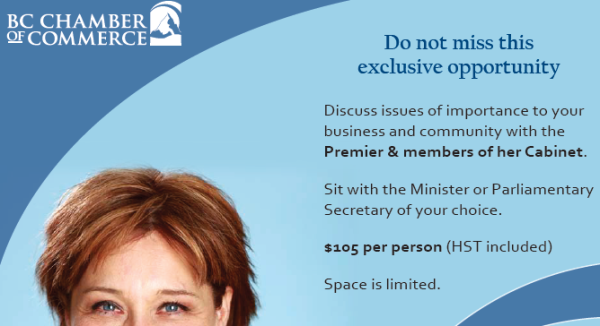An apothegm repeated often in programs treating alcohol abuse:
One drink is too many and one thousand is not enough.
The statement also applies to business leaders and their lobbyists. No matter the subsidies and tax relief gained and the political influence exercised, rewards are insufficient. Canadians have come to expect, if not accept, the command of business over old line parties, whose members supplicate themselves regularly before economic masters.
However, despite holding sway over senior levels of government, BC’s free enterprisers want more. The Chamber of Commerce demands municipal voting rights be extended to businesses. Without the vote, according to Chamber CEO John Winter, his commercial constituents have shouldered an “unfair tax burden.”
Corporate voting privileges is only one part of a Chamber policy priority: local government reform. Their platitude-rich statement of policy is fundamentally a call for elimination of local government powers because “rules vary from community to community and are subject to change based on local political considerations.” Business leaders prefer certainty in regulations, certainty their initiatives can proceed without regard to local aims and objectives.
Municipal reform is but one of the initiatives pursued by British Columbia’s business leaders. After losing the HST referendum, they want a “new and improved PST” to replace it. First, the Chamber suggests delay. They recognize that subverting the referendum result must proceed slowly:
Now is not the time for decisions, now is the time for reflection and a pause before we determine the best type of tax.
A pause, no doubt, to consider alternative ways to achieve that which HST had given business, which was freedom from about $2 billion a year in BC sales tax payments. At any rate, each month of delay puts more than $150 million into pockets of business such as Goldcorp, Teck Cominco, Spectra Energy, Teekay or other mega-corps.
Another initiative the BC Chamber promotes is Road Pricing, a system in which motorists pay tolls for driving on particular roadways or in a particular areas. The helpful Chamber realizes that government needs revenue sources and, since they hold that businesses should pay nothing and higher income taxes are intolerable, innovative levies on citizens are needed.
It is fair for business organizations to present their opinions and objectives to government but this should be done openly, always in the public eye. BC Liberals, although they once promised a “New Era of Accountability” and “The most open, accountable and democratic government in Canada”, have fallen into the habit of being accountable only to favoured lobbyists, usually behind doors barred to ordinary citizens and media.
Tuesday, Deputy Premier and Finance Minister Kevin Falcon appears before a private breakfast meeting with Chamber members at Vancouver’s Terminal City Club. Falcon will discuss the elimination of HST and reinstatement of PST, or some form of it. Two weeks later, Christy Clark and the entire Liberal Executive Council present themselves to the Chamber for “face-to-face consultation.”
Consider again my opening statement about business lobbyists behaving like insatiable addicts. Being a little further down the road toward complete business obeisance, our southern neighbours provide examples of what Canadians can expect. Businesses in this country do not want to pay taxes but American corporations have gone a step further.
David Cay Johnson, in a Reuters blog item, provided details in Paying taxes your employer keeps
…Instead of paying for police, teachers, roads and other state and local services that grease the wheels of commerce, Illinois workers at these companies will subsidize their employers with the state income taxes they pay.
The deal to let employers keep half or all of their workers’ state income taxes represents a dramatic expansion of a little-known trend in the law: diverting taxes from public purposes to private gain.
Throughout the United States, big box retailers like Wal-Mart (WMT.N), Lowe’s (LOW.N) and Cabela’s (CAB.N), and in some cases entire shopping malls, often negotiate deals to keep sales taxes that customers pay at the cash register, using the money to finance construction of their stores. This gives them a huge advantage over retailers without such subsidies, while reducing revenue to local governments, which in turn creates pressure for higher taxes.
…The Illinois deal shows how competition between the states, and with other countries, helps big corporations wring subsidies from state governments even as the states are being forced to fire teachers and other public workers because of a weak economy that has cost jobs and tax revenue.

67960921-premier-cabinet-lunch-2011-brochure-web
Categories: Clark, Christy, Taxation






Hmmmm, David Schreck reads your blog Norman, or GREAT MINDS THINK ALIKE, eh….In today's Norths Shore News http://www.nsnews.com/news/queries+Christy+cleavage/5517130/story.html
Ex-MLA queries Christy's cleavage
“Is it sexist to discuss appropriate dress?”
LikeLike
Victory lies in our hands. We just have to collect them.
A very large victory for Canadians, 70,000 strong and Harper listened.
A very important draconian omission from Harper Omnibus bill.
http://openmedia.ca/news/70000-strong-petition-sways-government-plan
LikeLike
Civil? hmmmmmm
I can't help but point to your readers of MP Rathika Sitsabaiesan airbrushing technique, and ask them not to be distracted by another one of Christy's photo ops. Focus on the politics at play here, not the person.
http://news.nationalpost.com/2011/09/23/the-case-of-the-disapearing-mp-cleavage/
LikeLike